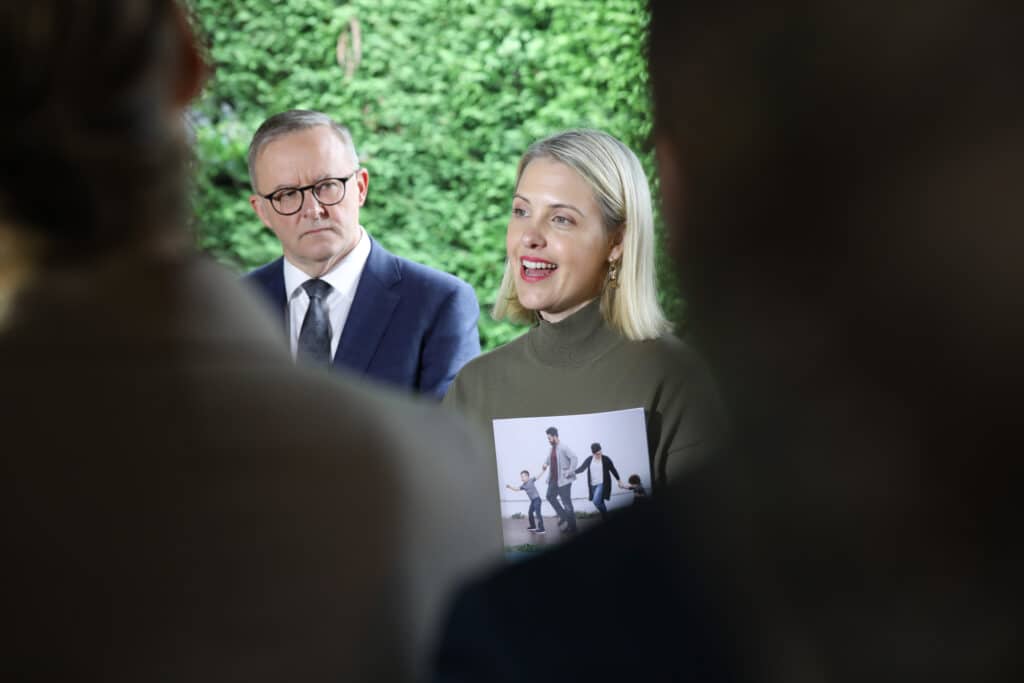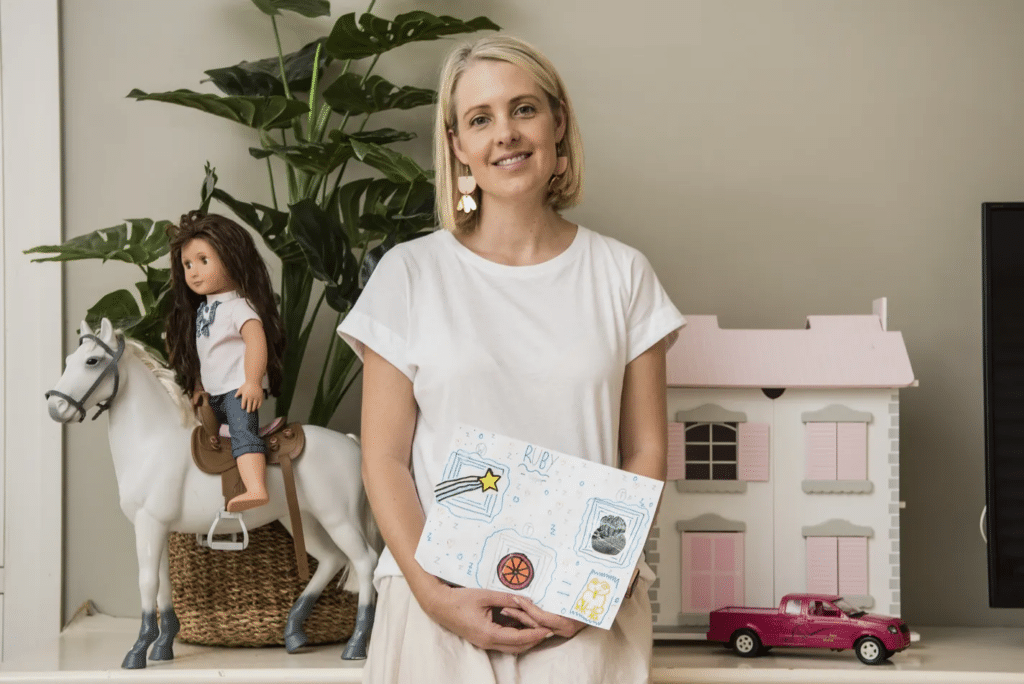Maybanke Anderson established the first free kindergarten in Australia and is a name we should all know. CEO of The Parenthood, Georgie Dent shares more, after being invited to deliver the 10th Annual Maybanke Lecture in Sydney on 29 May 2023.
I am mortified to say that until fairly recently Maybanke Anderson was not a name I was familiar with. Upon learning her name and reading about her extraordinary life it became immediately apparent that I was not just learning about a woman of formidable historic significance but, in fact, a long-lost kindred spirit. A kindred spirit whose legacy and vision is – almost a century since her passing – closer to being realised than at any point in Australia’s history.
Maybanke Anderson was once a household name to several generations of Australians but today is almost unknown. Born in 1845 in England, she arrived in Sydney in January 1855 with her parents and brothers and was educated as a teacher.
She was a woman who made things happen – as a teacher, a writer, a leader, an advocate and feminist. In 1895, she established the first free kindergarten in Australia, pioneering the free kindergarten movement, helping children and their working mothers.

For more than 50 years, Maybanke actively promoted the rights of Sydney’s women and children and was a leader in the women’s suffrage movement. To Maybanke, the vote was ‘the kernel of all reform’.
“When I stand up all the wild horse spirit surges up in me and though I tremble I feel as if I were ready to fight like a lioness but we shall win more by being soft so I am going to try to be as wise as a serpent and harmless as a dove,” Maybanke Anderson said.
She was president of the Women’s Literary Society from 1893 until 1897 as the organisation grew to be the Womanhood Suffrage League of New South Wales. Maybanke founded the Australasian Home Reading Union in 1893 – an education program for people in rural Australia and the forerunner to the Workers Education Association, the organisation she also helped found.
Education, women’s advocacy and social reform were the causes Maybanke championed – causes that continue to be as important now as they were in 1893. Maybanke died in 1927, while travelling overseas. Her legacy remains alive due to her family and, specifically, the Maybanke Fund which honours her work.
The Fund supports the Maybanke Anderson Award for Indigenous students in Education, at Macquarie University. For the last nine years The Maybanke Fund hosts The Maybanke Lecture on or around May 6, commemorating the anniversary of Maybanke’s first public speech. The lectures continue to advocate the social change that Maybanke dedicated her life to achieving.
Which is how we get to the part about how I came to learn of this remarkable woman. The Maybanke Fund, a subfund of the Sydney Community Foundation, have invited me to deliver the 10th Annual Maybanke Lecture in her honour in Sydney on the 29th of May at 6pm.
Seeking to do Maybanke’s legacy justice is no small task. It’s an incredible and daunting honour. It is, however, also fortuitous. In 2023 Australia is closer to realising a vision for universal early childhood education and care that aligns with Maybanke’s pioneering vision from a century ago. Maybanke knew that children having access to free quality early childhood education was critical to their development, wellbeing and education. She also knew that free quality early childhood education was critical for their mothers. For their own wellbeing, security and independence.
That remains the case today. For the last three years leading The Parenthood I have been on the frontline of a collective advocacy effort campaigning for bold reform of early childhood education and care. The dream we imagine is an Australia in which all young children – regardless of their postcode or their parents’ income – have access to free, or nearly free, quality early childhood education and care that is delivered by a workforce that is properly paid, supported and valued.
This dream, cause and campaign is not new. Those engaged in this work today stand on the shoulders of so many giants who have worked tirelessly to propel this cause, bit by bit, for over a century.
That cumulative and collective effort has Australia now perched on the precipice of transformational reform. We have a Prime Minister who has declared that universal quality early childhood education and care is the legacy he wants to leave. Prime Minister Albanase has – accurately – likened the scale of this change to Medicare. It would represent the most significant social and economic policy in more than a generation.
There is no greater nation-building, equity-creating, wellbeing-boosting reform. And it’s within reach. Right now there is a Productivity Commission inquiry underway not looking at “if” we can create a universal early childhood education and care system – but how.
It’s an inquiry being headed by the formidable Deb Brennan, a globally renowned expert in early childhood education and care, and has the full support of the Prime Minister, the Education Minister, the Social Services Minister and the Early Childhood Education Minister, to name a few. We have leaders in every single State and Territory committed to spending billions on meaningful reform in the early years. The consensus that early childhood education needs to be conceived and delivered as education is unprecedented.
It’s not hyperbole to say as a nation we are closer to realising Maybanke’s vision than ever before. That’s not to underscore the scale and complexity of change needed to implement such a vision. To say it’s complicated is an understatement of epic proportions.
There are great chunks of the country without any early childhood education and care right now. Almost every week, there is another community that is closing an early learning service or reducing the numbers because they haven’t got enough staff. It’s far worse in rural and remote settings but it’s a major problem in large regional areas and in cities too.
The early childhood education and care workforce is under threat with educators and teachers leaving in record numbers due to the poor rates of pay, lack of recognition and burn out.
There is no one-size-fits-all when it comes to early childhood education and care. When we say ‘universal’ we don’t mean uniform. We mean every community having access to quality, inclusive early childhood education and care that meets the needs of the children and families in that community.
There is no doubting the complexity and scale of designing and implementing truly universal early childhood education and care but it is not beyond us. We have plenty of evidence of what works really well. We have a world-leading quality framework. We have in the country right now thousands and thousands of Australians who are trained, skilled and experienced in early childhood education and care – they could – and should – be lured back with substantially better rates of pay, support and access to professional development that appropriately matches the value of their chosen career. Other countries have developed solutions.
If Maybanke Anderson was able to conceive and deliver free kindergarten for children in Sydney in 1895, I refuse to believe in the year 2023 with the backing of the Prime Minister and his cabinet, the Greens and the cross-bench, the states and territories, a unity ticket among business and union leaders, economists, child health experts, academics, the Productivity Commission, and more, that this can’t be done. May we all be as brave and bold in pursuit of this reform as Maybanke Anderson.
On the 29th of May I will attempt to do Maybanke Anderson’s legacy justice by delivering a lecture on what I’ve learned in the last three years campaigning for universal early childhood education and care and I would love for you to join me. Proceeds from the tickets go towards funding scholarships for Indigenous students in Education, at Macquarie University.
Tickets can be purchased here and if you’re not in Sydney you can view the livestream.


